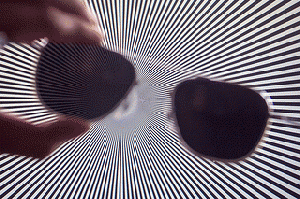So far in this "Swinging for the Fences" series, I'm laying the foundation for those answers by describing some of the dynamics acting in civilized societies over time. This is the third such piece, the other two being href="http://www.nonesoblind.org/blog/?p=11092">here and href="http://www.nonesoblind.org/blog/?p=11098">here.]
********************************
by GuySie
********************************
It's the process of POLARIZATION, a process by which the interaction between different points of view leads to an increasing division between those points of view. It is "systemic" in that the positions adopted by each side cannot be understood without reference to those adopted by the other side. It is destructive not only because it tends to increase the level of conflict in a society, but also to increase the level of folly.
In the 1970s and 1980s, I was focused mostly on the "magnets" already described, where systemic forces acted on people and societies as in The Parable of the Tribes and The Illusion of Choice. In the 1990s, I directed most of my attention to the problems associated with polarization because I was concerned about the destructive dynamic I saw operating in America, particularly in what was then being called the "culture war."
Here is a passage from an op/ed I published in the mid-1990s in both the Baltimore Sun and the San Francisco Chronicle. It is called "The Dance of Polarization."
"Polarization is something we can see happening constantly in human [systems and] relationships, on scales large and small. I have observed some relatively benign examples in my own life.
"When I drive with my mother -- who can envision accidents occurring at every turn -- she voices the need for caution to a degree I regard as extreme. In response, an impulse arises in me to drive less carefully than I usually do. In the presence of what I see as my mother's over-cautiousness, I have to work to maintain my more typical prudence. This dynamic leads to a division of labor concerning the polarity of caution and daring.
"Something analogous happens between me and my 18-year-old son. To my mind, he procrastinates too much; I lean on him to take care of business more promptly and reliably. His tendency toward procrastination may have developed in reaction to my tighter relationship with my inner Taskmaster. But whatever its origin, when I am in his presence, I tend to become even more like myself than usual: my taking-care-of-business muscles get tighter than even I am comfortable with.
"You have probably noticed how married couples can polarize in various ways -- between the slob and the compulsive straightener, the spendthrift and the miser, the one who does all the feeling and the one who is always rational and controlled, etc.
"When people divide on an issue, unless they find a resolution, they tend to push each other further out toward the opposite ends of the spectrum. Each end represents a value that is legitimate, but that also must be balanced against another value. Polarization is one way the system preserves balance, but it is an unstable and conflictual balance. Far better if the actors in the system, instead of dividing into mirror-image opposites of one another, could achieve the healthier balance of integration.
"But such integration is difficult. It represents that high human achievement: wisdom. In the absence of wisdom, people are compelled to struggle in their folly. Each side, wedded to its half-truth, sees the other as the problem. But the problem is a property of the system: the polarization and conflict are symptoms of the failure to find a way to bring together those values that are in tension."
I will talk more about polarization and the pathologies of our times in the next round of entries on these various "magnets."






